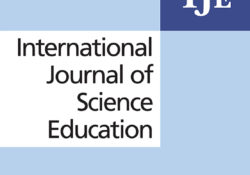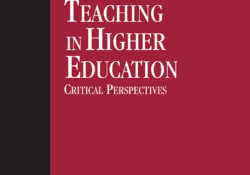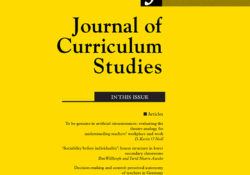eric.ed.gov har udgivet: The purpose of this paper is to explain how to use the scientific method as the framework to introduce mathematical model. Two interdisciplinary activities, targeted for students in grade 6 or grade 7, are explained to show the application of the scientific method while building a mathematical model to investigate the relationship between the circumferences and the diameter of circular objects. In the first activity, a research question is pursued as it relates to the stated hypothesis. In the second activity, the same research question is retained; however, the use of exploration helps to build the hypothesis. The activities serve as examples to show how middle school math teachers may use scientific inquiry to motive students‛ understanding of mathematical models as well as engage in science beyond… Continue Reading →
Like this:
Like Loading...
tandfonline.com har udgivet en rapport under søgningen „Teacher Education Mathematics‟: Abstract The paper starts from the thesis that unhindered international communication is a central characteristic of modern science. Second, the paper argues that scientific progress cannot be defined unequivocally in the social sciences. Four structures inhibit free international communication (linguistic barriers, the size of a national sociological community, the quality of scientific research, and the influence of specific sociologists and their schools). Third, three kinds of data are used to investigate the relevance of these factors: The participation in international congresses, the quotation patterns in major sociological journals and the reasons for the exceptional success of three sociologists, from the USA, France and Germany, respectively. Finally, a short hint toward the development of sociology outside the Western world is given.… Continue Reading →
Like this:
Like Loading...
tandfonline.com har udgivet en rapport under søgningen „Teacher Education Mathematics‟: ABSTRACT ABSTRACT The traditional description of “the scientific method” as a stepwise, linear process of hypothesis testing through experimentation is a myth. Although the teaching and learning of the scientific method have been a curriculum and assessment goal, the notion of the ‘scientific method’ itself has been identified as being problematic. Many researchers have recognised there is no single scientific method. However, there does not seem to be any useful guidelines for how best to deal with the nature of scientific methods in school science, including in high-stakes summative assessment. The article presents the use of a framework to illustrate the diversity of scientific methods that goes beyond the traditional limitations of a scientific method, to provide a more comprehensive… Continue Reading →
Like this:
Like Loading...
eric.ed.gov har udgivet: The Council of Chief State School Officers (CCSSO) was awarded a grant from the National Science Foundation to conduct a meta analysis study with the goal of providing state and local education leaders with scientifically-based evidence regarding the effects of teacher professional development on improving student learning. The analysis focused on completed studies of effects of professional development for K-12 teachers of science and mathematics. The meta analysis results show important cross-study evidence that teacher professional development in mathematics does have significant positive effects on student achievement. The analysis results also confirm the positive relationship to student outcomes of key characteristics of design of professional development programs. The following are appended: (1) Meta Analysis Coding Form Excerpt: Scaffolded Guide for Determining Inclusion of a Document; (2) Effects… Continue Reading →
Like this:
Like Loading...

tandfonline.com har udgivet en rapport under søgningen „Teacher Education Mathematics‟: ABSTRACT ABSTRACT Background: In response to reform recommendations calling for students’ engagement in scientific practices and the lack of the enactment of such practices in science classrooms, we explored the implementation of scientific practices with special emphasis on model-based inquiry in a secondary science teacher preparation program. Sample: The participants of this study were 26 preservice secondary teachers who engaged in a specially designed sequence that emphasized scientific practices. Purpose: Our aim in this study was to examine the impact of this specially-designed sequence on the participants’ views about the usefulness of scientific practices as a pedagogical approach, their intentions in implementing scientific practices as future teachers, and the nature of the emotions they experienced throughout their engagement in the sequence. Design and… Continue Reading →
Like this:
Like Loading...
tandfonline.com har udgivet en rapport under søgningen „Teacher Education Mathematics‟: ABSTRACT ABSTRACT Educational researchers have concluded that there are threshold concepts in a large number of disciplines. Yet, these researchers have not paid enough attention to the objection to the theory. It is beset with severe definitional and empirical problems. I will portray definitions of ‘threshold concepts’ provided by Land and Meyer, the founding fathers of the threshold concept theory. I argue, in the first place, that the definitions fail and, in the second place, that even if the definitional problems were solved and we were able to identify some threshold concepts, their scientific importance would be limited if not nil. Link til kilde
Like this:
Like Loading...

tandfonline.com har udgivet en rapport under søgningen „Teacher Education Mathematics‟: ABSTRACT ABSTRACT Inquiry-based lessons have been demonstrated to improve children’s scientific thinking (i.e. reasoning abilities and domain-specific knowledge). Although empirical evidence shows that inquiry-based learning requires instruction, research comes from two approaches that have not been bridged yet: direct instruction of scientific reasoning and teacher training of verbal support. We investigated how these two types of instruction separately or combined strengthened children’s scientific thinking by comparing four conditions: baseline, direct instruction, verbal support, and a combined approach. Effectiveness of an inquiry-based lesson series on scientific reasoning abilities, vocabulary, and domain-specific knowledge (near and far transfer) were studied among 301 fourth graders. Results showed that both approaches strengthened different components of scientific reasoning abilities, and that a combination of instructions was… Continue Reading →
Like this:
Like Loading...
tandfonline.com har udgivet en rapport under søgningen „Teacher Education Mathematics‟: ABSTRACT ABSTRACT This article aims to highlight how a scientific and critical approach is used in assessment dialogues during the last period of a practical, school-based teacher education programme. The result is based on 13 assessment dialogues conducted in a course at a Swedish university, where one of the course objectives is to, ‘in a scientific way, analyse teaching situations based on learning theories’. The assessment dialogues were analysed drawing from Bernstein’s concepts of ‘classification’, ‘framing’, ‘horizontal knowledge’ and ‘vertical knowledge’. The result shows that only in a minority of the assessment dialogues are students expected to use theory as an analytical tool and to critically examine their teaching practice. The theory is used in a more instrumental way to… Continue Reading →
Like this:
Like Loading...
tandfonline.com har udgivet en rapport under søgningen „Teacher Education Mathematics‟: The contribution of the scientific research for a less vulnerable and more resilient community: the Val d’Agri (Southern Italy) case Link til kilde
Like this:
Like Loading...
eric.ed.gov har udgivet: This meta analysis study focused on identifying and analyzing research studies that measured effects of teacher professional development with a content focus on math or science. This meta analysis was carried out to address two primary questions: (1) What are the effects of content-focused professional development for math and science teachers on improving student achievement as demonstrated across a range of studies?; and (2) What characteristics of professional development programs (e.g., content focus, duration, coherence, active learning, and collective participation of teachers) explain the degree of effectiveness, and are the findings consistent with prior research on effective professional development? This meta analysis of studies of teacher professional development programs in mathematics and science found that 16 studies reported significant effect sizes for teacher development in relation to… Continue Reading →
Like this:
Like Loading...






